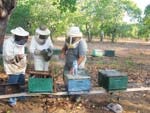On top of its numerous sustainability designations and awards, Tropical Traders this year launches another initiative: Bee Well Honey, a 100 percent organic blend of wildflower nectars produced by beekeeping cooperatives in Brazil.
July 25, 2011

Picture Hawaii: exotic beaches, fragrant hibiscus, friendly natives… and on a rural portion of the Big Island, one of the United States’ only domestically produced certified organic honeys: Royal Hawaiian Honey. And, behind the honey, a company that's as committed to sustaining its bees as it is to protecting the planet.
 "Hawaii is an isolated place and is much more pristine to produce honey compared to the other states," said Rebeca Krones, co-owner of Tropical Traders, the company she and now-husband Luis Zevallos launched in 2005 to market Royal Hawaiian Honey. The honey is produced by beekeeper Michael Krones, Rebeca's father, who has kept bees in Hawaii since 1996. Honey is sold directly to consumers and is also available in bulk to manufacturers.
"Hawaii is an isolated place and is much more pristine to produce honey compared to the other states," said Rebeca Krones, co-owner of Tropical Traders, the company she and now-husband Luis Zevallos launched in 2005 to market Royal Hawaiian Honey. The honey is produced by beekeeper Michael Krones, Rebeca's father, who has kept bees in Hawaii since 1996. Honey is sold directly to consumers and is also available in bulk to manufacturers.
"Organic is important, not only for traceability but also for the health of the bees," said Rebeca. "We are losing about 30 percent of our bees year to year in the U.S. and it is completely unsustainable. Nobody can specifically say what’s causing colony collapse disorder, but theories include pesticides."
Among a host of sustainability initiatives (post-consumer recycled packaging; reusing pallets to ship honey; advocating for environmental sustainability) one stands out. "Being organic is not just about producing the honey but also about how the rest of your company operates," said Rebeca. In 2007, the company's honey became the nation's first certified CarbonFree® food product. And this year, Tropical Traders was awarded a CoolCalifornia Small Business Award for its reduction in greenhouse gas emissions.
To get the CarbonFree® designation, a company determines the carbon footprint of its products, reduces it whenever possible and offsets the remaining emissions through Carbonfund.org by investing in CO2-reducing, sustainability projects.
Tropical Traders faced a big hurdle – no manufacturing is done in Hawaii, so there's a lot of packaging shipped back and forth from the mainland. While on the ship, the plastic (lighter than glass) tubs nest inside each other, a cost-effective way to ship more while reducing weight and expending less energy. The bee farm is also in the process of installing solar panels in order to be 100 percent solar-powered by 2011.
This year the company launched another sustainability initiative: Bee Well Honey, a 100 percent organic blend of wildflower nectars produced by beekeeping cooperatives in Brazil.
"In the last five years we’ve seen an increase in demand and we have a limited production out in the islands," said Rebeca. So in 2009, the Traders visited Brazil, the world's leader in organic honey production, to form a Fair Trade certified honey partnership – ensuring that beekeepers are guaranteed a fair price while sustaining organic honey production, bees and beekeeping communities in Brazil.
"I know how hard it is for a farmer – my dad’s a beekeeper," said Rebeca. "So we make sure all the honey we purchase is produced in a way that’s much better for the bees and for the planet."
About the Author(s)
You May Also Like




